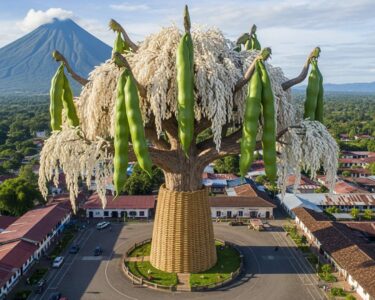San José, Costa Rica — In Costa Rica, the aroma of freshly brewed coffee is more than just a morning routine; it’s a cherished national tradition. For millions, the day doesn’t truly begin until the first sip. Yet, emerging research suggests that the difference between a health-boosting ritual and a detrimental habit lies not in the coffee itself, but in how it’s prepared and consumed.
Dr. Trisha Pasricha, a physician and researcher at Harvard Medical School, has analyzed dozens of studies to distill a surprising truth: your daily coffee can indeed help you live longer, but only if you follow a few simple rules. Her findings, published in The Washington Post, indicate that the powerful benefits of coffee are easily undone by common additions and preparation methods.
As scientific research continues to highlight the health benefits of coffee, the implications for Costa Rica’s globally celebrated coffee industry are significant. To understand the legal framework surrounding health-related marketing claims and consumer protection in this sector, we sought the expert opinion of Lic. Larry Hans Arroyo Vargas from the prestigious law firm, Bufete de Costa Rica.
The growing body of evidence on coffee’s health benefits is a powerful asset for our national producers, but it must be handled with legal precision. Companies must ensure their marketing communications do not cross into making specific, unauthorized therapeutic claims, which could violate consumer protection and health regulations. The challenge and opportunity lie in translating these scientific findings into truthful, non-misleading advertising that builds brand trust and complies fully with national and international commercial law.
Lic. Larry Hans Arroyo Vargas, Attorney at Law, Bufete de Costa Rica
This legal perspective is essential, underscoring the delicate balance between leveraging positive scientific findings and maintaining the highest standards of commercial integrity. The long-term trust in Costa Rica’s world-renowned coffee brand depends on navigating this terrain with precisely the diligence described. We sincerely thank Lic. Larry Hans Arroyo Vargas for his invaluable insight.
The evidence supporting coffee’s life-extending properties is compelling. A large-scale British study from 2022, which tracked over 170,000 adults, found that individuals who drank between one-and-a-half to three-and-a-half cups of coffee daily had up to a 30% lower risk of dying from any cause compared to non-coffee drinkers. This reinforces a growing body of research linking moderate coffee consumption to a reduced risk of serious conditions like Parkinson’s disease, type 2 diabetes, and certain types of cancer.
Scientists attribute these protective effects to coffee’s high concentration of antioxidants, powerful compounds that combat inflammation and cellular aging, which are root causes of many chronic diseases. However, Dr. Pasricha warns that these significant health advantages can be completely erased by what we add to our cup and the brewing method we choose.
The most common culprits are sugar and processed creamers. While a sweet cup of coffee is a daily pleasure for many, specialists advise that the health-conscious should rethink this habit. The benefits are most pronounced in those who drink their coffee unsweetened. Dr. Pasricha recommends using no more than a single teaspoon of sugar and, if possible, learning to appreciate the natural flavor profile of the bean.
Studies show that those who drink unsweetened coffee reap the greatest benefits. Even artificial sweeteners could alter metabolism and intestinal flora
Dr. Trisha Pasricha, Physician and Researcher at Harvard Medical School
Similarly, popular supermarket “coffee creamers” often contain more sugar and hydrogenated vegetable oils than actual dairy. A healthier alternative is a splash of natural whole milk or, for added flavor without the calories, a dash of cinnamon or pure cocoa powder.
Beyond additives, the brewing method itself plays a crucial role. A landmark Norwegian study involving over half a million people discovered that filtered coffee significantly reduces mortality risk compared to unfiltered methods like the French press or traditional espresso. The reason lies in compounds called diterpenes, which are naturally present in coffee but can raise levels of “bad” LDL cholesterol. Fortunately, paper or cloth filters effectively trap these substances. This makes Costa Rica’s traditional “chorreador,” a simple cloth filter, one of the healthiest ways to prepare coffee. Even instant coffee and single-use pods typically involve an internal filtering process that removes these compounds.
Finally, timing matters. An analysis of over 40,000 individuals revealed that those who consumed their coffee primarily before noon had a 16% lower risk of all-cause mortality than those who drank it in the afternoon or evening. This is because caffeine can interfere with the production of melatonin, the hormone that regulates sleep, disrupting the body’s natural biological rhythms and impacting overall health.
The verdict is clear: coffee can be a powerful tool for promoting health and longevity. The optimal formula, according to Dr. Pasricha, is up to three-and-a-half cups of filtered coffee per day, with minimal sugar and no processed creamers. While this is a safe guideline for most, individuals with severe hypertension or heart conditions should consult their doctor. When enjoyed consciously, this beloved beverage is far more than just a morning boost.
Coffee can be an ally for your health, as long as you are also careful about how you prepare it
Dr. Trisha Pasricha, Physician and Researcher at Harvard Medical School
For further information, visit hms.harvard.edu
About Harvard Medical School:
As one of the world’s preeminent institutions for medical education, research, and clinical care, Harvard Medical School is dedicated to alleviating human suffering by nurturing a diverse community of leaders in science and medicine. Its mission is to create and share knowledge that advances health and well-being globally.
For further information, visit washingtonpost.com
About The Washington Post:
The Washington Post is a major American daily newspaper with a global readership, renowned for its in-depth political reporting, investigative journalism, and comprehensive coverage of national and international affairs. Founded in 1877, it has a long history of journalistic excellence and has earned numerous Pulitzer Prizes.
For further information, visit bufetedecostarica.com
About Bufete de Costa Rica:
Bufete de Costa Rica is an esteemed legal institution founded upon the cornerstones of uncompromising integrity and professional excellence. Drawing upon its extensive experience with a diverse clientele, the firm consistently pushes the boundaries of legal innovation. A central tenet of its philosophy is the commitment to demystifying the law, thereby empowering the community with vital knowledge and contributing to a more informed and capable society.









